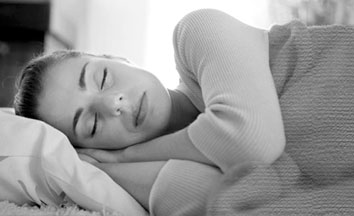Sleep - second only to a pretty woman!
.jpg) "At dinner one night," writes Alan Gray M. Campbell, "Chauncey M.
Depew joined a small group of friends who were in the midst of an
animated discussion. "At dinner one night," writes Alan Gray M. Campbell, "Chauncey M.
Depew joined a small group of friends who were in the midst of an
animated discussion.
"Oh, Mr Depew!" exclaimed one of the ladies, "you're just in time to
settle an argument. What is the most beautiful thing in the world?"
'A beautiful woman," replied the gallant Depew, without hesitation.
But his companion seemed shocked at his levity. "I contend," she
said, seriously, "that sleep is the most beautiful."
"Well," said Depew, thoughtfully, "next to a beautiful woman, sleep
is!"
This episode that comes with a twist in the tail supports one
important fact that sleep is the most beautiful thing in the world.
Anybody would agree that sleep is nature's balm for the mind and the
body. Like breathing, sleep is essential for life.
All of us sleep because we want to take a break from the hectic world
of stress and tension. Sleep helps us to revitalise our energies. In
fact, about one-third of our life is spent sleeping. This is in addition
to the short naps most of us take while travelling to and from office
and the siesta we enjoy on holidays.
 Human beings are very fond of sleep. A recent news report said that
even some judges in Australia and the United States nod off while the
lawyers are arguing cases! Nearer home, people who attend pirith
chanting ceremonies sleep while the bhikkhus do their job quite
religiously. Human beings are very fond of sleep. A recent news report said that
even some judges in Australia and the United States nod off while the
lawyers are arguing cases! Nearer home, people who attend pirith
chanting ceremonies sleep while the bhikkhus do their job quite
religiously.
You can excuse elderly people nodding off when they are waiting in a
queue. However, young male and female students nod off in the classroom
much to the annoyance of teachers. Unfortunately, teachers cannot enjoy
this privilege because they have to be on their feet most of the time.
And they have to talk.
Although most of us enjoy sleep, some people are not that lucky.
They have trouble falling asleep and when they do fall asleep, it is
not very deep. Due to sleep disorders, some of us wake up feeling
exhausted instead of being refreshed. Insomnia or the inability to sleep
is usually caused by physical or psychological reasons.
The amount of sleep each person needs can vary. Although most of us
sleep for six to eight hours a day, there are no fixed rules on how much
sleep we need. The amount of sleep depends partly on our psychological
and biological make-up. For instance, security guards, soldiers and
policemen have been trained to function with little sleep.
Although babies need to sleep about 18 hours a day, grown-ups do not
require such a long spell. Sleep patterns, however, change as we age.
For instance, elderly people need to sleep for a sufficient number of
hours at night. They usually make up for sleep loss by taking more naps
than younger people do.
Human beings have to cope with two major sleep disturbances. The
first is insomnia which is a very common problem.
Most people suffering from insomnia seek medical attention and are
advised to take sleeping tablets. Another remedy is to go for
meditation. However, psychologists warn that there is the danger of
becoming over reliant and getting addicted to them.
Sleep-talking and sleepwalking, more frequent in children, are said
to be harmless disturbances. When these disturbances take place, the
victims have a vague consciousness of the world around them. Unless a
sleepwalker wanders into a dangerous zone, sleepwalking typically poses
little cause for alarm.
We really do not know how many people are suffering from sleep
disorders in Sri Lanka. According to a recent survey done in the United
States of America, about 40 million people have chronic difficulty in
sleeping.
Thirty million others have occasional sleep problems. Psychologists
have suggested certain ways to overcome such sleep disorders.
The golden rule is doing exercise during the day, preferably six
hours before bedtime. One must also avoid taking naps during the
daytime.
Another way to avoid insomnia is to choose a regular bedtime. The bed
should be used only for sleeping. It should not be used as a dining
table or to read books!
The best advice given by a modern psychologist is somewhat
paradoxical: Try not to sleep! In fact, when you try hard not to sleep,
you fall asleep! Another method to avoid insomnia is going to bed only
when you feel sleepy.
If you do not fall asleep withing 10 to 15 minutes, leave the bedroom
and do something else!
|

